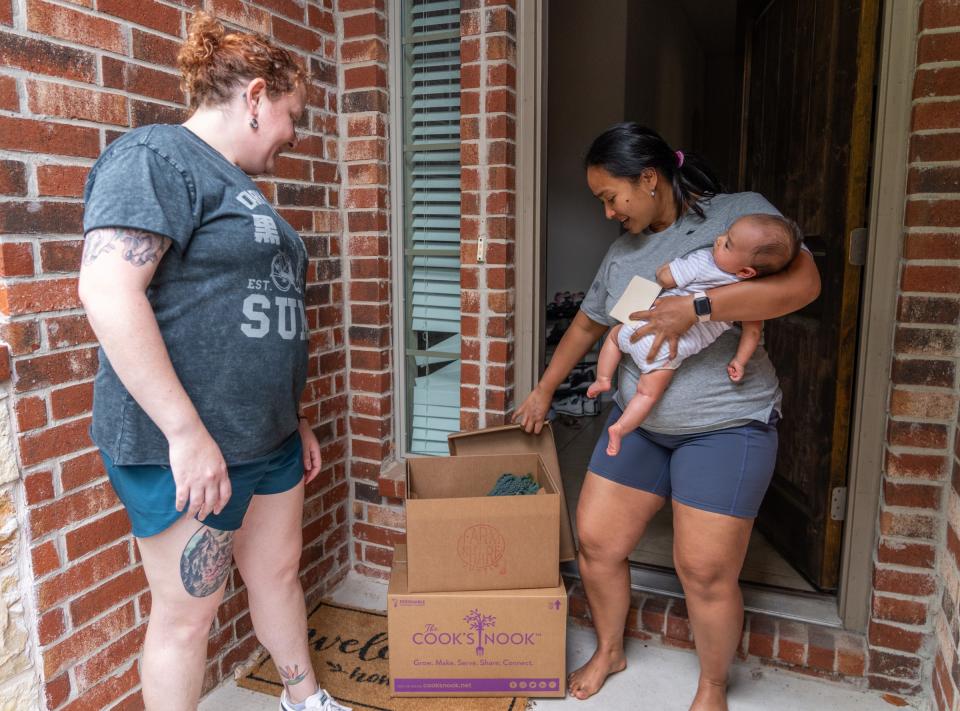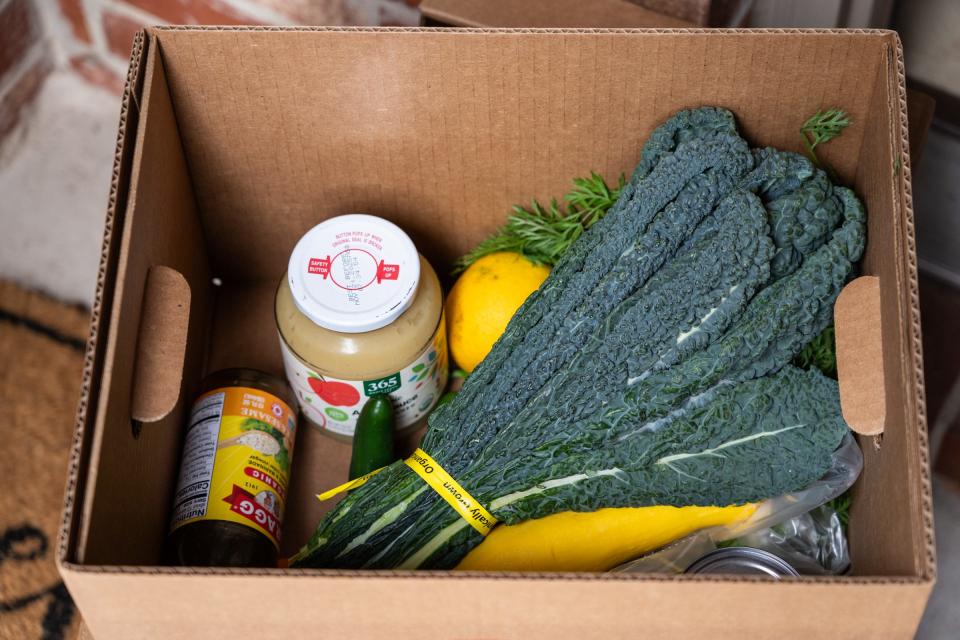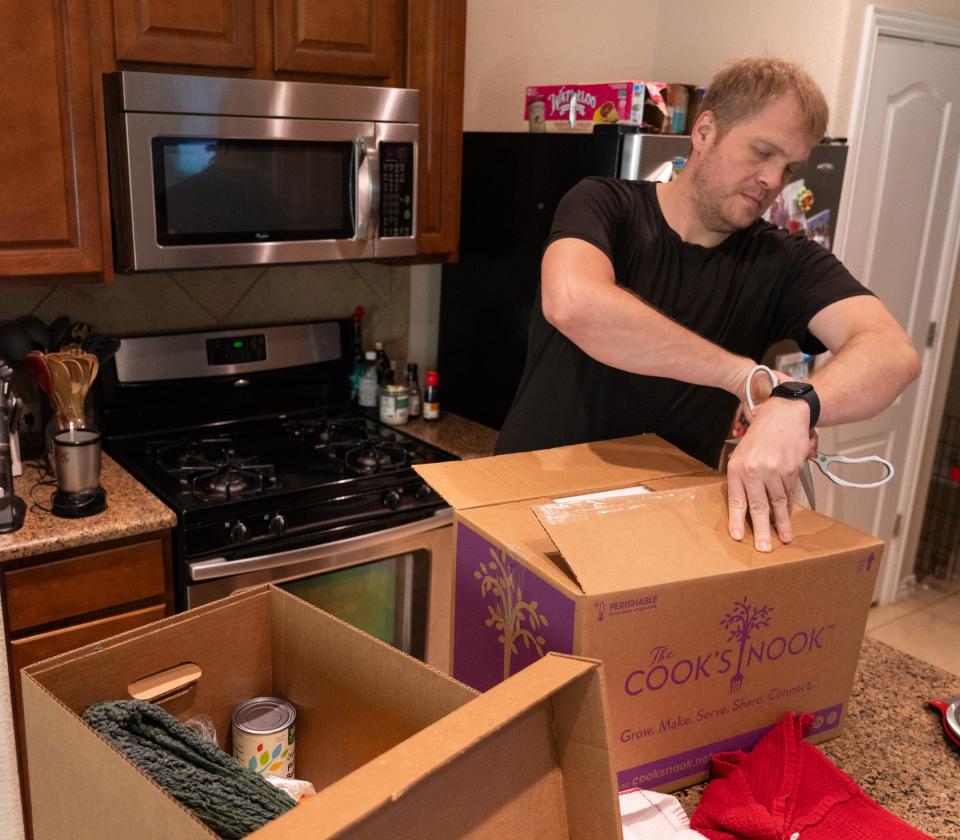In Ascension Seton program, new baby arrival comes with special food delivery
Inten Utari's daughter, Nadia, looks intensely at the visitors delivering two big boxes of food to her home. Utari and her daughter have been in a pilot program at Ascension Seton Medical Center called Food is the Best Medicine.
Each week for eight weeks, new mothers who are identified through a questionnaire as having food insecurity receive a box of fresh vegetables and shelf-stable items from Farmshare Austin, a supplier of locally grown, fresh fruits and vegetables, and six ready-to-eat meals from Cook's Nook, which specializes in medically nutritious prepared meals as well as grains that can be added to other meals.
"It has really helped us," Utari said of the program. "The first couple of weeks, it was a mess. I was bleeding; she had jaundice. I don't know what we would have done."

Having food available was one of the things Utari worried about when she was pregnant. Utari, who is from Bali, and her husband, who is from New Hampshire, have no family locally. She also said he's not the best cook. How would she get fed during her recovery from giving birth and while breastfeeding, which increases the need for nutrient-rich food?
"We've been stressed out about it," she said. Since being part of the program, "I feel it's less stress."
This pilot program, which began in September, has helped 78 new mothers become more food-secure with weekly food deliveries. Each mother gave birth at Ascension Seton Medical Center, which is Austin's safety net delivery hospital.
The participants also live in one of the 22 ZIP codes where Farmshare Austin delivers its food boxes.
More: How fire ant bites led to discovery, treatment of rare disease for Texas woman
Most of the recipients are uninsured or underinsured, said Elizabeth Polinard, the co-founder of the program. About 70% speak only Spanish.
Mothers who did not want to participate or were not eligible because of their ZIP codes were given a $100 H-E-B gift card and connected to resources.
The program is funded by the Ascension Seton Foundation, with support from Farmshare Austin and Cook's Nook, as well as research by the Michael and Susan Dell Center for Healthy Living at the UTHealth Houston School of Public Health in Austin.
A $400,000 Health Care by Food grant from the American Heart Association and individual donations at supportseton.org/womenfirst/FBM have secured additional funding to make what was a 12-month program last through the fall.

Why is food a health care concern?
In Austin in 2021, 14.4% of people experienced food insecurity, according to a 2022 report by the city of Austin Office of Sustainability.
"It is going to require a team of people to solve," said Dr. Ryan Lowery, a CommUnityCare pediatrician and Physicians Foundation fellow who is working to encourage other doctors to have these conversations. Those teams could include the doctors and medical staffers, nonprofit organizations and policymakers.
"We really need to address drivers of health to improve health outcomes," he said.
Those drivers include food access, housing, transportation, utilities and safety.
More: Live from Austin: Heart surgeries at St. David's use new technology while world watches
"Food is the Best Medicine speaks to the collaboration at a health care system level between a health care system and a not-for-profit organization like a local farm share," Lowery said. "Organizations like that help move the needle at a community level," he said.

Looking at the data
The data gathered through this pilot program will be used to study:
Whether food access improves rates and lengths of breastfeeding.
Whether mothers' mental health scores improve.
Whether mothers and babies have better physical health scores.
Whether mothers cook more meals at home and are less food-insecure after the provided food term ends.
The program also is studying whether providing a community health worker to help with cooking and education resources has a better outcome and gives families less food insecurity than providing a website with resources about food preparation and nutrition.

How could the program help more mothers?
Polinard, a consultant to Ascension Texas' neonatal and perinatal program as well as a University of Texas Dell Medical School professor, is hoping the research and additional funding will allow the program to expand to the other Ascension Texas hospitals as well as increase the number of weeks a new mom receives food.
"One of the takeaways we hear a lot is 'we wish this would be longer,’ ” Polinard said.
The program has tailored some of the fruits and vegetables the families receive to offer more familiar items such as potatoes, corn, tomatoes and greens, though Farmshare Austin still throws in the occasional lesser-known vegetable such as Swiss chard along with the familiar carrots.
"We have a very wonderful and lofty vision," Polinard said. The aim is to provide food for moms throughout Central Texas, and not just for eight weeks but during pregnancy and six months after delivery.
"It's very fund-driven," she said.
This article originally appeared on Austin American-Statesman: Ascension Seton program delivers eight weeks of food to new mothers

